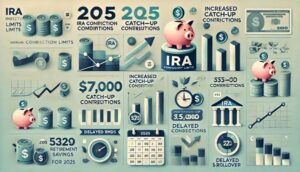Understanding how your income affects your Social Security benefits and Medicare premiums is crucial as you approach or navigate through retirement. For high-income retirees, two critical factors come into play: the Income-Related Monthly Adjustment Amount (IRMAA) and the potential taxation of Social Security benefits. Both elements can significantly impact your retirement budget, making strategic planning essential.
What is IRMAA?
IRMAA is an additional charge applied to your Medicare Part B and Part D premiums if your income exceeds certain thresholds. The Social Security Administration uses your income from two years ago (as reported on your IRS tax return) to determine if you owe IRMAA. For example, your 2024 Medicare premiums would be based on your 2022 income.
IRMAA is structured in brackets, with higher income levels incurring larger adjustments. It’s important to note that these brackets are subject to change, and the thresholds may be adjusted yearly. Planning to manage or reduce your Modified Adjusted Gross Income (MAGI) can help minimize the impact of IRMAA on your retirement expenses.
How Social Security Benefits Can Be Taxed
Many retirees are surprised to learn that their Social Security benefits can be taxable if their combined income exceeds certain limits. Your combined income includes your adjusted gross income, nontaxable interest, and half of your Social Security benefits. If this total exceeds $25,000 for individuals or $32,000 for married couples filing jointly, a portion of your benefits may be taxable.
The percentage of Social Security benefits subject to tax ranges from up to 50% to up to 85%, depending on your combined income level. Like IRMAA, strategic income planning can help manage the taxation of your benefits, potentially lowering your overall tax liability.
Strategies to Minimize the Impact
- Delay Taking Social Security Benefits: Delaying your benefits beyond your full retirement age can increase your monthly benefit amount and may help you stay below the thresholds for IRMAA and benefit taxation.
- Manage Your Income Sources: Be mindful of how withdrawals from retirement accounts, such as IRAs and 401(k)s, impact your MAGI and combined income. Sometimes, it makes sense to utilize Roth IRA withdrawals (which do not count towards your MAGI) or to consider Roth conversions in earlier years when your income might be lower.
- Invest in Health Savings Accounts (HSAs): Contributions to HSAs are tax-deductible, and withdrawals used for qualified medical expenses are tax-free. This can reduce your MAGI, potentially lowering your IRMAA charges.
- Tax-Loss Harvesting: This involves selling investments at a loss to offset capital gains in your portfolio. It’s a strategy that can reduce your taxable income and help manage your tax bracket and IRMAA bracket.
- Life Insurance Products: Certain types of life insurance policies can offer tax-advantaged income streams that do not count toward your MAGI. However, these products can be complex and require careful consideration and planning.
The Bottom Line
For high-income retirees, understanding and planning for IRMAA and the taxation of Social Security benefits are key components of managing retirement income effectively. By adopting strategic financial planning techniques, you can mitigate these costs and maximize your retirement income.
It’s advisable to consult with a tax professional or financial advisor who can provide personalized advice based on your unique financial situation. Planning ahead and being proactive about your retirement income can make a significant difference in your financial security during your golden years.





